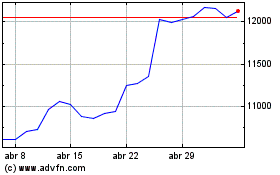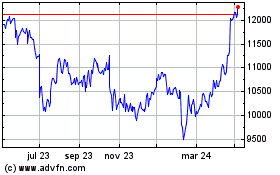By Jason Douglas and Jenny Strasburg
LONDON -- New evidence from the U.K. showed Covid-19
vaccinations sharply reduced serious illness and deaths among
elderly people after just one dose, bolstering optimism that
successful vaccination programs offer a return to economic growth
this year after a year of widespread lockdowns.
The real-world data from the country that is vaccinating a
greater proportion of its population than any major Western economy
also offers support for the U.K. government's strategy of
stretching out limited vaccine supplies by delaying a second shot
of vaccine by up to 12 weeks after the first to protect more people
from the disease.
British researchers said in preliminary findings published
online Monday that a single dose of Covid-19 vaccine developed
either by Pfizer Inc. and BioNTech SE or the University of Oxford
and AstraZeneca PLC reduced the risk of hospitalization among
people over 70 years old by 80%, compared with those of a similar
age who weren't vaccinated.
The study adds to evidence from across the world that vaccines
are broadly as effective in the real world as they were shown to be
in clinical trials, giving hope that mass rollouts can reduce the
need for restrictive public-health measures and pave the way for
economic reopening.
"It is going to hopefully take us into a very different world in
the next few months," England's deputy chief medical officer
Jonathan Van-Tam said Monday, referring to vaccination.
The study, which hasn't yet been reviewed by other scientists,
should help dispel concerns in parts of Europe that AstraZeneca's
shot doesn't have enough data to back up its rollout to at-risk
over-65s.
It adds to broader evidence that the vaccines are saving lives.
The U.K. program gave priority to the most vulnerable people,
starting with the people over 80 and healthcare workers, before
moving down the age scale.
On Jan. 19, U.K. government figures showed that 61% of all
Covid-19-related deaths were of people over 80. On Feb 23, just 49%
were from that age group. More than 20 million people in the U.K.
have received at least one vaccine shot, around 38% of the adult
population.
In the U.S., a vaccination push in nursing homes has also shown
encouraging signs as government reports of new resident deaths from
Covid-19 have been declining for weeks.
After recording more than 6,000 new resident deaths during a
week in mid-December, U.S. nursing homes most recently reported
1,464 new resident deaths for the week ended Feb. 24, federal data
show. That number will likely be revised higher in the next report,
but not enough to change the declining trend.
The portion of weekly U.S. Covid-19 deaths from nursing homes
has tumbled to the lowest levels since the federal government first
tracked nursing-home statistics in late May last year, according to
a Wall Street Journal analysis of the data. The declines in nursing
home deaths are also outpacing declines in overall U.S. Covid-19
fatalities, data show.
The British study, led by England's public health agency, looked
at health records associated with 7.5 million people over 70 in
England, making it one of the largest such studies published to
date. Researchers zeroed in on more than 150,000 people with test
results matching vaccination records.
The scientists found a single dose of either vaccine reduced the
risk of symptomatic Covid-19 and hospitalization from as little as
10 days after injection, with the strongest effects seen after 28
days. Results suggest both the Pfizer and AstraZeneca shots reduce
the odds of symptomatic disease by around 60% in those over 70,
after adjusting for factors including age, sex, ethnicity and
location. The risk of hospitalization was around 80% lower for
those getting a vaccine compared with those who didn't.
The study also examined the risk of hospitalization in the
more-vulnerable over-80s who did develop symptoms, and the risk of
death in the same group among those who received the Pfizer shot.
Those vaccinated with symptoms had a 43% lower risk of admission to
hospital compared with symptomatic unvaccinated cases, and their
risk of dying of Covid-19 was halved.
Data on mortality for those who got the AstraZeneca shot weren't
available because it was approved and rolled out later. Symptomatic
cases among those vaccinated had a 37% lower risk of
hospitalization than unvaccinated cases.
Public-health officials are especially upbeat on data showing
the vaccines' effectiveness at reducing hospitalizations and
deaths, even among older citizens most at risk. Researchers have
also been optimistic about evidence that vaccines reduce
transmission of the virus, and have said data so far suggest a
single dose can help curb transmission even when the infected
person doesn't have symptoms.
That optimism is tempered, however, by the emergence of new
coronavirus variants that appear to make vaccines less effective.
Genome sequencers in the U.K. have identified six cases of a
variant that appears to have emerged in Brazil, prompting an effort
to track down others who could have contracted the variant.
Globally, progress on vaccinations is patchy with countries such
as the U.K. moving rapidly and others, including elsewhere in
Europe, lagging behind.
Take-up of the Oxford-AstraZeneca shot in particular in parts of
Europe has been slow, reflecting concern among some national
regulators that the data on its effectiveness in over-65s were
lacking. French President Emmanuel Macron added to the popular
doubts, saying the vaccine was "quasi-ineffective for people older
than 65 years."
British officials said that the latest data should put those
fears to rest.
"I hope that right round the world people study these data,"
said Health Secretary Matt Hancock at a news conference Monday.
The U.K took the unusual step of extending the interval between
first and second doses of vaccine to around 12 weeks from the month
or so the manufacturers recommend. Scientific advisers said such a
strategy would allow public-health officials to provide at least
some protection to many more people in the early stages of the
vaccine rollout.
Anthony Harnden, the deputy chair of the U.K.'s vaccine-advisory
committee, said the data show that the U.K.'s strategy of
stretching out doses to curtail deaths quickly was the right move
and "has undoubtedly saved a large number of lives."
Researchers have also said it is still important that people
receive their second dose. Some scientists have been worried that
people could get careless, especially as they look forward to the
lifting of tight lockdown restrictions.
--Max Colchester and Jon Kamp contributed to this article.
Write to Jason Douglas at jason.douglas@wsj.com and Jenny
Strasburg at jenny.strasburg@wsj.com
(END) Dow Jones Newswires
March 01, 2021 16:34 ET (21:34 GMT)
Copyright (c) 2021 Dow Jones & Company, Inc.
Astrazeneca (LSE:AZN)
Gráfica de Acción Histórica
De Mar 2024 a Abr 2024

Astrazeneca (LSE:AZN)
Gráfica de Acción Histórica
De Abr 2023 a Abr 2024
